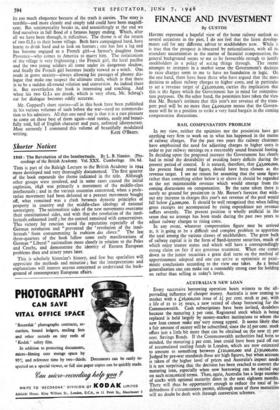Shorter Notices
1848: The Revolution of the Intellectuals. By L. B. Namier. (Pro- ceedings of the British Academy. Vol. XXX. Cumberlege. 10s. 6d. 1848: The Revolution of the Intellectuals. By L. B. Namier. (Pro- ceedings of the British Academy. Vol. XXX. Cumberlege. 10s. 6d.
Tins is part of the Raleigh Lecture to the British Academy in 1944 more developed and very thoroughly documented. The first quarter of the book expounds the theme indicated in the title. Although other groups were involved, and in some cases caused the initial explosion, 1848 was primarily a movement of the middle-class intellectuals ; and in the various countries concerned, when a prole- tarian movement had been defeated or a peasant movement bought off, what remained was a clash between dynastic principles of property in country and the middle-class ideology of national sovereignty. The nationalistic sides of the new movements overcame their constitutional sides, and with that the revolution of the intel- lectuals exhausted itself ; for the control remained with conservatives. This victory for reaction saved the reputation especially of the German revolution and "prevented the 'revolution of the intel- lectuals' from consummating la trahison des clercs." The last three-quarters of the book follow some early manifestations of German " Liberal " nationalism more closely in relation to the Poles and Czechs, and demonstrate the identity of Eastern European problems then and ninety years later.
This is scholarly historian's history, and few but specialists will appreciate the methods and minutiae ; but the interpretations and explanations will interest anyone concerned to understand the back- ground of contemporary European affairs.


























 Previous page
Previous page